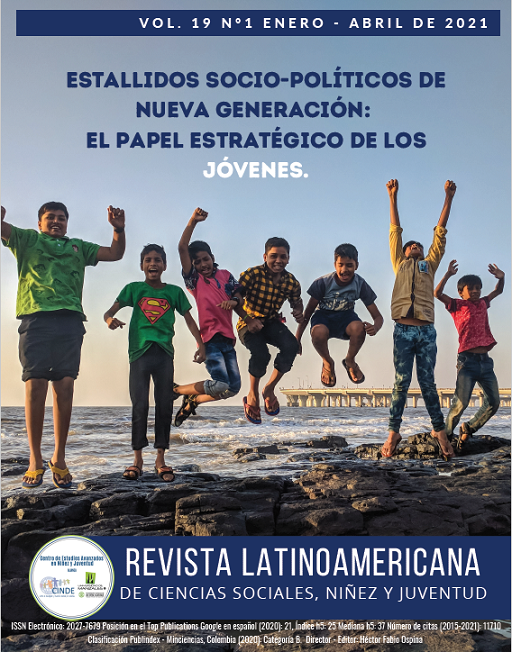De Hogra para Hirak: Neocolonialismo, memória e dissidência política juvenis no Rif
Conteúdo do artigo principal
Resumo
Resumo (analítico)
As teorias sobre os movimentos sociais dominantes são baseadas em experiências ocidentais. No entanto, ¿em que medida elas podem nos ajudar a compreender o processo de construção solidária de práticas políticas em contextos politicamente autoritário não-ocidentais? Bayat e a sua excepcionalidade árabe nos advertem que, nas ciências sociais, o uso de modelos epistemológicos ocidentais em contextos não-ocidentais tem frequentemente esquecido as múltiplas particularidades desses territórios, sociedades, dos processos que nelas surgem e se desenvolvem. Este artigo, no âmbito do projeto Transgang, tomará como caso de estudo um movimento social que surgiu na região do Rif em 2016 o qual foi liderado por jovens, visando analisar as suas particularidades culturais a partir de perspectivas decoloniais. Finalmente, apresentar-se-ão algumas conclusões abertas para futuras pesquisas sobre movimentos sociais juvenis nas sociedades árabes.
Palavras-chave: Juventude, movimentos sociais, colonialismo, descolonialismo, primavera árabe, Hirak, Rif, Morocco.
##plugins.themes.bootstrap3.displayStats.downloads##
Detalhes do artigo
Seção

Este trabalho está licenciado sob uma licença Creative Commons Attribution-NonCommercial-ShareAlike 4.0 International License.
Você tem o direito de:
- Compartilhar - copiar e redistribuir o material em qualquer suporte ou formato
- Adaptar - remixar, transformar, e criar a partir do material
- O licenciante não pode revogar estes direitos desde que você respeite os termos da licença.
De acordo com os termos seguintes:
-
Atribuição - Você deve dar o crédito apropriado, prover um link para a licença e indicar se mudanças foram feitas. Você deve fazê-lo em qualquer circunstância razoável, mas de nenhuma maneira que sugira que o licenciante apoia você ou o seu uso.
-
NãoComercial - Você não pode usar o material para fins comerciais.
-
CompartilhaIgual - Se você remixar, transformar, ou criar a partir do material, tem de distribuir as suas contribuições sob a mesma licença que o original.
- Sem restrições adicionais - Você não pode aplicar termos jurídicos ou medidas de caráter tecnológico que restrinjam legalmente outros de fazerem algo que a licença permita.
Como Citar
Referências
Al-Maarouf, M. D., & Belghazi, T. (2019). The event of death: Reflections on the dynamics of emotions and embodied resistance in the Moroccan contexts of hirak (movement) and la hirak ((non)movement). Journal of Cultural Studies, 33(4), 632-656. https://doi.org/10.1080/09502386.2018.1543335
Al-Messiri, S. (1974). Ibn al-balad: A concept of Egyptian identity. Brill.
Al-Sharnouby, D. (2017). In absence of a hero figure and an ideology: Understanding new political imaginaries and practices among revolutionary youth in Egypt. Middle East Topics & Arguments, 9, 84-95, https://doi.org/10.17192/meta.2017.9.6835
Bamyeh, M. A. (2012). Anarchist philosophy, civic traditions and the culture of Arab revolutions. Middle East Journal of Culture and Communication, 5(1), 32-41. https://doi.org/10.1163/187398612x624355
Bayat, A. (2013). Life as politics: How ordinary people change the Middle East. Stanford University Press. https://doi.org/10.1515/9780804786331
Burke, E. (1986). Understanding Arab social movements. Arab Studies Quarterly, 8(Fall), 333-345.
De Madariaga, M. R. (2009). Abd-el-Krim el Jatabi: la lucha por la independencia. Alianza.
Feixa, C. (Dir.), Sánchez-García, J. (Coord.), Ballesté, E., Cano-Hila, A. B., Masanet, M.-J., Mecca, M., & Oliver, M. (2019). La (Trans) banda: notas y cuestiones para la investiga-ción de grupos juveniles de calle (Transgang Working Papers 2.2). Universitat Pompeu Fabra; European Research Council. https://doi.org/10.31009/transgang.2019.wp02.2
Grosfoguel, R. (2011). Racismo epistémico, islamofobia epistémica y ciencias sociales coloniales. Tabula Rasa, (14), 341-355. https://doi.org/10.25058/20112742.431
Hodgson, M. (1974). The venture of Islam: Conscience and history in a world civilization: Vol. 1. The classical age of Islam. University of Chicago Press.
Honwana, A. (2013). Youth and revolution in Tunisia. Zed Books.
Human Rights Watch. (2018). Informe Mundial 2018. http://bit.ly/2LIVDe9
Loudiy, F. (2014). Transitional justice and human rights in Morocco: Negotiating the years of lead. Routledge. https://doi.org/10.4324/9781315856063
Martín, M. (2002). El colonialismo español en Marruecos (1860-1956). Club de Amigos de la Unesco.
Melucci, A. (1991). La acción colectiva como construcción social. Estudios Sociológicos del Colegio de México, IX(26), 357-364.
Mignolo, W. (2015). Habitar la frontera: sentir y pensar la descolonialidad. CIDOB.
Peregil, F. (2018). El líder de las protestas del Rif, condenado a 20 años de cárcel. El País. https://elpais.com/internacional/2018/06/27/actualidad/1530085677_392283.html
Quijano, A. (1989). Modernidad, identidad y utopía en América Latina. El Conejo.
Quijano, A. (2014). Cuestiones y horizontes: de la dependencia histórico-estructural a la colonialidad/ descolonialidad del poder. Clacso.
Salafranca, J. (2001). El sistema colonial español en Ãfrica. Algazara.
Sánchez-García, J. (2018). De la esperanza a la represión: el interminable "estado de emergencia" en Egipto. En L. Queirolo-Palma, & L. Stagi (Eds.), Winou el shabab (pp. 81-114). Genova University Press.
Schielke, S. (2015). Egypt in the future tense: Hope, frustration, and ambivalence before and after 2011. Indiana University Press. https://doi.org/10.2307/j.ctvxkn64g
Seddon, D. (1986). Riot and rebellion: Political responses to economic crisis in North Africa, Tunisia, Morocco and Sudan. University of East Anglia.
Singerman, D. (1995). Avenues of participation: Family, politics and networks in urban quarters of Cairo. Princeton University Press.
Slymovics, S. (2005). The performance of human rights in Morocco. Pensilvania University Press.
Tilly, C. (2004). Social movements, 1768-2004. Paradigm Publishers.
Vairel, F. (2015). Politique et mouvements sociaux au Maroc. Presses de Sciences.
Walton, J., & Seddon, D. (1994). Free markets & food riots: The politics of global adjustment. Blackwell.

